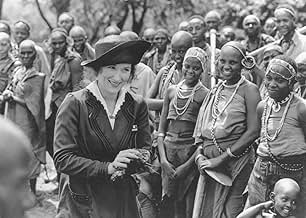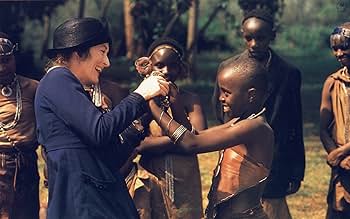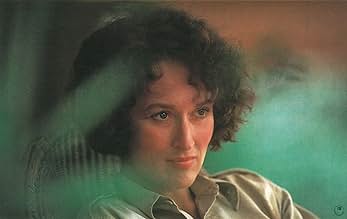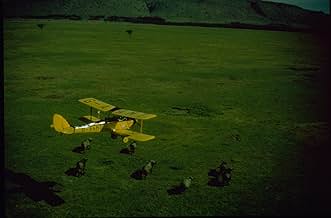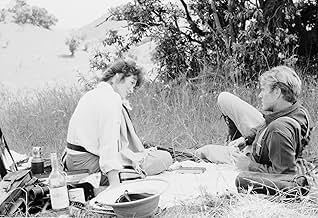Karen Blixen é uma dinamarquesa que vai morar numa plantação de café no Quénia Britânico. Presa a um casamento por conveniência com um marido ausente, irá conhecer Denys Finch Hatton, um ari... Ler tudoKaren Blixen é uma dinamarquesa que vai morar numa plantação de café no Quénia Britânico. Presa a um casamento por conveniência com um marido ausente, irá conhecer Denys Finch Hatton, um aristocrata inglês que se torna o seu grande amor.Karen Blixen é uma dinamarquesa que vai morar numa plantação de café no Quénia Britânico. Presa a um casamento por conveniência com um marido ausente, irá conhecer Denys Finch Hatton, um aristocrata inglês que se torna o seu grande amor.
- Direção
- Roteiristas
- Artistas
- Ganhou 7 Oscars
- 30 vitórias e 31 indicações no total
Avaliações em destaque
Syndey Pollock hit the nail right on the head with this classic beautiful cinematography. The acting is excellent by Streep, Redford, and Klaus Maria Brandeur. I liked the scene when Karen (Streep) wants her servant to address her by her name and he said "You are Karen, Sabu". I also loved the owl that she had in her room - it was a small one, but it was so cute and I loved it.
If you have a chance to rent this movie, please do - it is a classic. I love the beginning line "I had a farm in Africa" it was so moving!!
While I do understand Phyllida's attempt to have Meryl foreshadow others to show Thatcher's dominance, the movie itself became a one-woman show that barely gave a s*** about the supporting cast. While in Out of Africa, Pollock never resorts to showy camera work to highlight Meryl. The camera moves through the picturesque Africa and the beautiful Meryl so naturally as if the cameraman was lost in the beauty of the entire place. While Meryl is a marvel, Pollock himself is a wise man who gave the picture an independent existence. The Iron Lady will always remain Meryl's Iron Lady.
Based on a true story, Out of Africa shows Karen Blixen's life as she adjusts to the African lifestyle while romancing Denys (Redford) and divorcing Bror (Klaus). The opening itself talks of the farm at the foot of the Ngong Hills and is voiced by Streep in a very distinctive accent. Many of her performances, especially the ones where she uses accents, are slightly difficult to accept first but shine later, even though she does sound like Sly Stallone at times, especially when she says in one scene "I want you to COME HOME". Karen marries Bror to retain her title of baroness and moves to Africa. Bror uses her money against her wishes and doesn't take care of her properly. Karen meets Denys and another guy, and invites them to her home. Both the guys are attracted to her but things go awry for one. Denys and Karen fall in love but Denys lives a very different life, independent like Karen but in a nomadic way. Karen runs the entire farm, opens up a school and acquaints and adjusts herself with the Africans.
Pollack has handled the movie tactfully, and the film is enriched by fine performances. The green verdant lands of Africa with the pastoral huts of the Africans on one hand and the lavishness of the Britishers on the other can be seen. There is this lovely scene where the tribe chief tells Karen that only tall children will go to school. When Karen tells him that sending kids would be very wise of him, the African replies that the Britishers have learned to read, but it has not helped them in any way. Still, the farmers hold respect for Karen's caring nature.
Clocking at 2 hours and 40 minutes, Out of Africa is like a landscape of a beautiful bird on its mighty flight over the flowing rivers and the dense forests. My Rating: 8 out of 10
There are two movie cuts floating around, which I tried to pursue through Universal, and then Disney. Forget it. Suffice to say there is a theatrical version and a Disney TV version, with little consequential difference to the plot except that the latter edits out a little of Karen's physical lovemaking with Denys and slightly expands her intellectual relationship with Farah; which to some degree helped buttress the development of his absolute devotion to her.
The screenplay resembles Isaak Dinesen's semi-autobiographical book very little; even so, she did not tell the whole truth in her book. You'll have to get over it, except that I think the character development suffered the loss of Blixen's deep involvement with the displaced Kikuyu tribe working her coffee plantation. Also, without an understanding of the historical times, it would be too easy to say simplistically that this is a woman trying to live within the terms of a marriage of convenience and then compensating with pursuit of a doomed passion.
What was crafted out of a mishmash of a more-or-less factual account and director Sydney Pollack's vision is still a beautiful love and adventure story in the midst of British colonial rule and an earlier, more racially and sexually biased era.
Klaus Maria Brandauer as Baron Bror von Blixen (whew! - who called Karen "Tannen," adding to my initial confusion) perfectly portrays that fun man you like immensely but could never really trust with anything important like your feelings. He along with several of the key male figures and symbols in this movie will eventually bow in respect to the "man" Karen Blixen becomes despite his often shabby treatment and other travails, because she rises above it all and perseveres. Redford plays mostly Redford. His Finch Hatton's sense of independence is fragile and illusory and will ultimately cost him dearly.
There are a couple of continuity problems that bother me to this day, including the disappearing-reappearing champagne and the continually retracking parade marchers, but for the most part few expenses or attentions to detail were spared, especially in the lavish costuming. "Bare-breasted native women" will unfortunately also make their National Geographic appearance.
Even so, Out of Africa is a treasure with a half dozen or more perfect and unforgettable scenes; a movie as long as this review, but I hope you'll agree, worth your patience.
Oscars Best Picture Winners, Ranked
Oscars Best Picture Winners, Ranked
Você sabia?
- CuriosidadesEarly in the film, Baroness Karen Blixen is introduced to her servants. Although the scene is inter-cut with close-ups and other inserts in the film, the first take was filmed as one long shot that required Meryl Streep to meet and exchange dialogue with several other characters. As soon as director Sydney Pollack yelled "Cut", Streep, wearing a high-collared shirt and snug jacket, yelled "get this thing off of me!" and ripped open her jacket. A large beetle had crawled down the front of the jacket moments after the camera rolled, yet she continued filming the scene. Much of it remains in the final film.
- Erros de gravaçãoDuring the lion attack, Denys pulls an additional two spare cartridges from his belt as a ready reload. However, he carries them with his right hand, his trigger hand, which also is the hand needed to break the action to reload. No experienced double-gun hunter would do this. The two reload cartridges must be carried in the left hand, leaving the right hand free to manipulate the rifle.
- Citações
Karen Blixen: It's an odd feeling, farewell. There is such envy in it. Men go off to be tested, for courage. And if we're tested at all, it's for patience, for doing without, for how well we can endure loneliness.
- Cenas durante ou pós-créditosEpilogue: "Karen Blixen published her first stories in 1934 under the name Isak Dinesen. She never returned to Africa."
- Versões alternativasNetwork TV version features additional footage not included in theatrical release.
- ConexõesEdited into A Song of Africa (2000)
- Trilhas sonorasConcerto for clarinet and orchestra in A (K.622)
Written by Wolfgang Amadeus Mozart
Performed by Jack Brymer Clarinet, The Academy of St. Martin-in-the-Fields
Directed by Neville Marriner
Used Courtesy of Philips Classic Productions, The Netherlands
Principais escolhas
- How long is Out of Africa?Fornecido pela Alexa
Detalhes
- Data de lançamento
- País de origem
- Central de atendimento oficial
- Idiomas
- Também conhecido como
- África mía
- Locações de filme
- Empresa de produção
- Consulte mais créditos da empresa na IMDbPro
Bilheteria
- Orçamento
- US$ 31.000.000 (estimativa)
- Faturamento bruto nos EUA e Canadá
- US$ 87.071.205
- Fim de semana de estreia nos EUA e Canadá
- US$ 3.637.290
- 22 de dez. de 1985
- Faturamento bruto mundial
- US$ 227.514.205
- Tempo de duração2 horas 41 minutos
- Cor
- Proporção
- 1.85 : 1
Contribua para esta página




